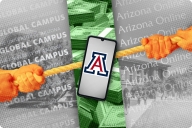You have /5 articles left.
Sign up for a free account or log in.

Students expressed mixed feelings about the benefits and drawbacks of virtual job interviews.
monzenmachi/E+/Getty Images
Virtual recruiting is both a relief and a concern to college students, who feel mixed emotions as employers, colleges and universities have had to scramble to shift job fairs online amid the pandemic.
That leaves students, colleges and employers facing different versions of the same questions: How can they best use a relatively new medium, e-recruiting, in order to match talented graduates with open positions in a turbulent labor market? Do they have the skills and comfort level needed to thrive in this new world of remote recruiting?
According to new survey data published by job search platform Handshake, 48.7 percent of responding students said they felt less intimidated about online interviews for jobs and internships than in-person interviews. But 52.2 percent expressed concern about their ability to effectively communicate from behind a computer screen.
The survey of just over 1,000 U.S. students at four-year and two-year colleges, conducted in January, found that 44.5 percent of respondents appreciate the reduction in scheduling barriers that online interviews afford. But a slightly larger proportion of students, 52.8 percent, worried they wouldn’t be able to make as strong a connection with recruiters remotely as they would in person.
The results of the survey illustrate that students see the advantages of a remote system but are also unsure about the expectations being placed on them, said Christine Cruzvergara, vice president of higher education and student success for Handshake, which is a major player in online job recruitment of college students.
Online job fairs, meetings and interviews are still recent developments to many students, and it is natural that some may feel trepidation about these new settings, Cruzvergara said. She noted there is a big difference between sitting in a virtual classroom and listening to a lecture versus actually speaking one-on-one with someone over Zoom, Google Meet or Microsoft Teams. Each platform has its own quirks that only become familiar with experience, she said.
“Students want to make sure that they are doing all the things that they should be doing to present their best selves in this new medium,” Cruzvergara said. “There’s always going to be a little bit of nervousness anytime you’re using a new tool.”
At the same time, many companies have been forced to improve their online recruitment processes because of COVID-19, said Casey Welch, co-founder and CEO of Tallo, a recruitment platform designed for high school and college students.
“There were a few companies that focused on virtual recruitment before the pandemic because it diversified their candidate pool,” Welch said. “When we went remote and students couldn’t go to school or college in person, other companies couldn’t recruit in traditional ways. They had to flip online.”
In the Handshake survey results, 70 percent of respondents reported that they think employers will have to participate in virtual career fairs. Research by Tallo found similar results, Welch said. Notably, he said that Gen Z students think about their career paths earlier than millennials did and want employers to be more proactive in contacting them.
Arabella Werner, a senior at the University of Louisville who is majoring in communications and minoring in Spanish, recently secured a sales position at Dell Technologies after the company invited her to attend an online information session through the Handshake platform.
“They messaged me stating that they had an information session in two weeks, RSVP here. So, I went ahead and RSVP’d,” Werner said. “I didn’t really know what to expect going into it, so that was a little nerve-racking, but I thought I’d give it a go.”
Werner learned a lot from the Dell Technologies information session and found the virtual environment less stressful than an in-person career fair, she said. She also liked that multiple people who hold different positions at Dell shared their experience working at the company, and she liked that there was an opportunity to ask questions via chat as well as verbally.
Everyone who attended the information session was invited to interview if they wanted to, Werner said.
“Of course, I signed up for that interview, and it was pretty lengthy -- about an hour. But I prepared pretty well,” she said.
Werner worked with career services staff at the University of Louisville to update her Handshake profile, uploading a profile picture and a résumé, she said. She advises other students to keep their profiles up-to-date and respond promptly when companies reach out.
“I was anxious about finding a job because I know the unemployment rate has gone up because of COVID-19,” Werner said. “It was definitely challenging, and I did hear back from some jobs that I didn’t get. But I was focused on my mission and just kept pushing forward and applying and applying.”
Handshake’s job search platform is available to students at over 1,100 universities and colleges, and the vast majority of these institutions offer interview prep to students, according to Cruzvergara. She added that practice interviews over Zoom are a great way for students to get comfortable with the process.
In addition to practicing with career services professionals, 46.7 percent of survey respondents reported conducting mock interviews with friends and family. Just under 42 percent said they practice meditation and deep breathing to keep calm and maintain composure.
Mock interviews can help students figure out if they’re sitting in a place with good lighting, determine if their Wi-Fi is strong and practice what to do if they get disconnected, Cruzvergara said. This practice isn’t just useful for interview settings. It’s also helpful for virtual job fairs where students can meet with recruiters in one-on-one sessions, she said.
“It’s helpful to walk students through everything -- show them how to screen share, ask them to show their portfolio, tell them how they’re presenting,” she said.
The University of Nebraska at Lincoln has seen good engagement with the Handshake platform and virtual career fairs in the past year, said Bill Watts, associate dean of undergraduate advising and career development. Around 14,000 of the university’s 20,000 undergraduate students have created Handshake accounts and are using the platform.
Since students at Lincoln are studying both in person and remotely, career services are offered in both modalities. But students are mostly reaching out remotely, Watts said.
The university's career coaches are tied to various academic colleges so that students get advice that is tailored to their career goals and interests, Watts said.
“We try to really engage students in the three big questions of life,” he said. “Who are you? What do you want to be? And how are you going to get there?”
Virtual career fairs at Lincoln have seen almost the same level of engagement as in-person career fairs, according to Watts. A big advantage is that students can schedule time for a one-on-one meetings with recruiters, he said.
“From what we’ve heard from students and employers, those 10-minute sessions kind of blew everyone away,” Watts said. “It’s tough to walk up to a stranger and introduce yourself. In that online setting, you are still connecting with a stranger, but you know that that time has been set aside for you. It’s much less stressful than that giant arena setting.”
Though virtual fairs have their advantages, Watts predicts that there will still be employers that will want to visit campuses, meet students and raise brand awareness in the future. He also predicts that recruiting will still be fairly regional in nature, despite the fact right now that companies can recruit workers from anywhere in the country.
“The vast majority of students are only considering opportunities within a relatively fixed geographic region,” he said.
The environment is highly competitive right now for job seekers, particularly if they are early career and interviewing alongside much more experienced candidates, said Catherine Ward, managing director at JFF, a nonprofit organization that aims to increase educational and economic opportunities for underserved populations in the U.S. Ward pointed to statistics from the online job marketplace ZipRecruiter suggesting that internship postings were down by 30 percent between 2019 and 2020. While the big companies made a point of keeping these experiential positions open, many smaller companies have had to abandon them, she said.
“We are hearing from a lot of companies that they are starting to think more creatively about where they can source their talent, and some are rethinking when they need to be in the office,” Ward said. “There’s a realization that a lot of work can be done very successfully remotely. Productivity rates in white-collar positions, particularly, are up right now.”
Tech companies and companies that are experiencing growth right now are not necessarily located in hubs where the pool of potential employees is diverse, Ward said.
“As employers start to look more broadly at where they can hire, they can start hiring people outside of their hubs, which is very promising with regard to diversity,” Ward said. “It also means that companies have to be very intentional once they bring people on board to provide the right kind of support that will enable them to stay and grow.”








